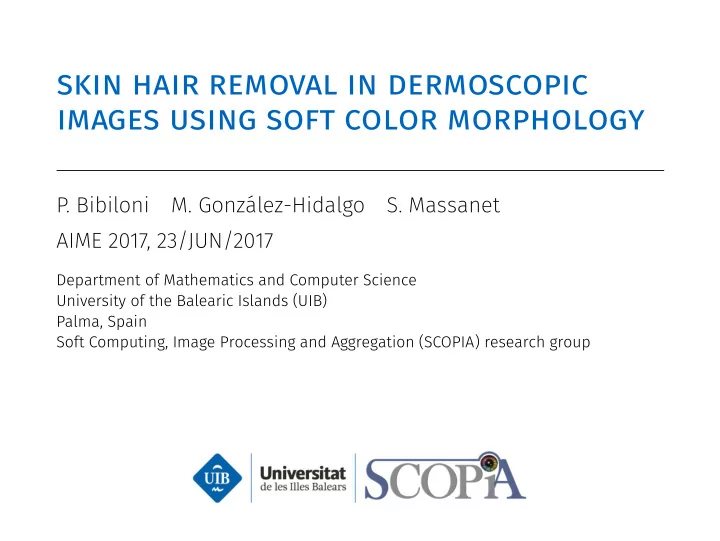

skin hair removal in dermoscopic images using soft color morphology P. Bibiloni M. González-Hidalgo S. Massanet AIME 2017, 23/JUN/2017 Department of Mathematics and Computer Science University of the Balearic Islands (UIB) Palma, Spain Soft Computing, Image Processing and Aggregation (SCOPIA) research group
motivation 1
How? Hair Detection + Inpainting our method (a) Original image (b) Hairless image 2
our method (a) Original image (b) Hairless image How? Hair Detection + Inpainting 2
(c) Hair Mask hair detection method Color Mathematical Morphology Extract thin and dark objects. (a) Original (b) Contrast enhanced image 3
hair detection method Color Mathematical Morphology Extract thin and dark objects. (a) Original (b) Contrast (c) Hair Mask enhanced image 3
(b) Hairless image (c) Hairless image (with missing information!) inpainting method Color Mathematical Morphology Recover information from surrounding objects. (a) Hair mask 4
inpainting method Color Mathematical Morphology Recover information from surrounding objects. (a) Hair mask (b) Hairless image (c) Hairless image (with missing information!) 4
conclusions ∙ Mathematical morphology for color images. ∙ Competitive results: ∙ hair removal vs. texture preservation. ∙ Preliminary step. 5
what next? Figure: Annotation tool - Overview 6
what next? Figure: Annotation tool - Detail 6
acknowledgments This work was partially supported by the project TIN 2016-75404-P AEI/FEDER. P. Bibiloni also benefited from the fellowship FPI/1645/2014 of the Conselleria d’Educació, Cultura i Universitats of the Govern de les Illes Balears under an operational program co-financed by the European Social Fund. 7
Thank you 8
Recommend
More recommend